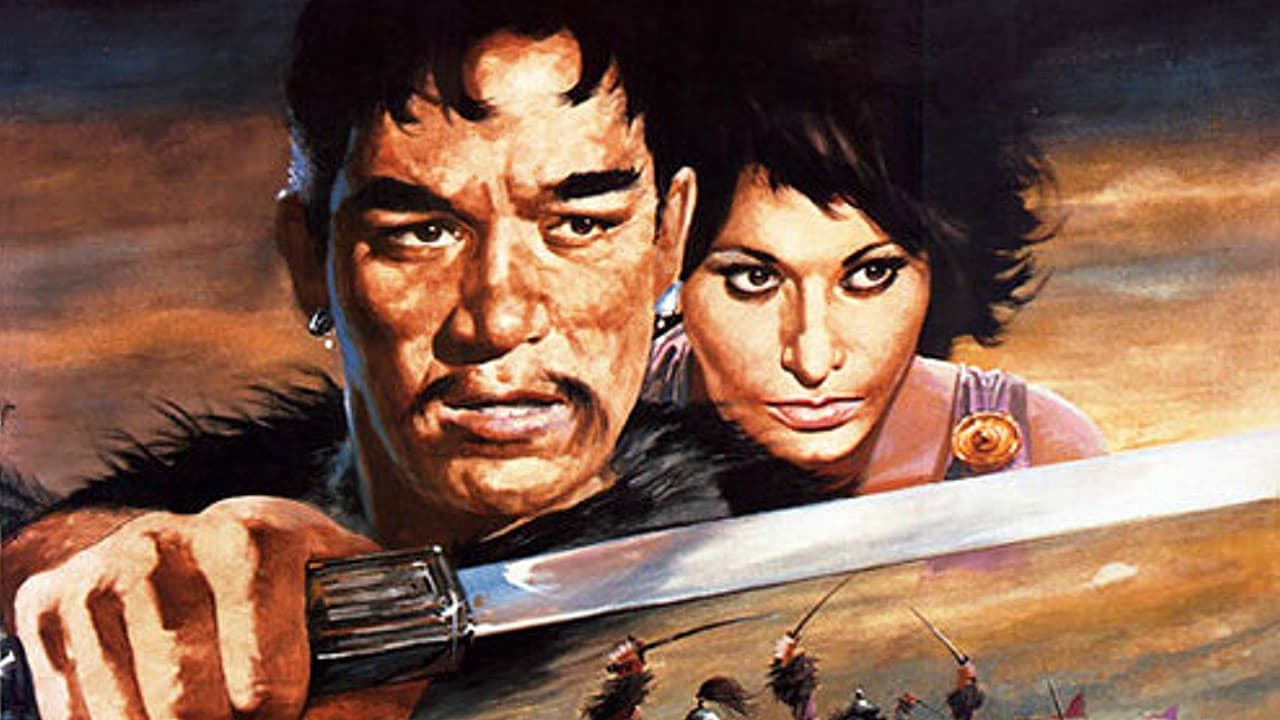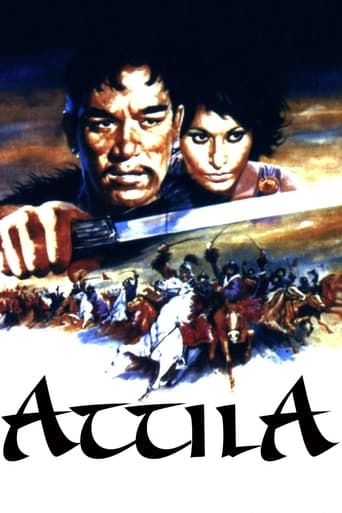

Although it has its amusing moments, in eneral the plot does not convince.
... View MoreIt's entirely possible that sending the audience out feeling lousy was intentional
... View MoreAll of these films share one commonality, that being a kind of emotional center that humanizes a cast of monsters.
... View MoreThe movie really just wants to entertain people.
... View MoreThe acting schools are extremely expensive. And what they teach you is how to control your breathing, how to scratch your balls or jump up. Anthony Quinn is a real acting school only by himself, just watching any of his movies, you have a lot to learn. Even in this film, the one born in Chihuahua, Mexico, makes us a great demonstration of huge talent, embodying "The Scourge of God". He is the most credible Attila of all the movies. Sophia Loren, very young, is good as Honoria. Henri Vidal is convincing too as Aetius. Same Claude Laydu as the idiot Emperor Valentiniano Caesar. Irene Papas, also very young, is OK as Grune. Christian Marquand, who was to become the director of the "Candy" masterpiece, is a Hun leader.
... View MoreKnowing of director Francisci’s subsequent contribution to the peplum genre, I fully expected this to be a low-rent version of SIGN OF THE PAGAN (1954) – which I watched the previous day – but the film ultimately proved fairly interesting in its own right. For one thing, the narrative has at least as many differences as similarities vis-a'-vis the Douglas Sirk epic and, once again, we have an imposing Hollywood star (Anthony Quinn) in the lead. Sophia Loren, then, stands in for Ludmilla Tcherina (though her character is ambitious and deceitful) while Henri Vidal – from the best Italian-made spectacular, FABIOLA (1948) – replaces Jeff Chandler (bafflingly, he dies here while Attila is allowed to live!). Another reversal has the Huns fighting amongst themselves – more specifically, Attila and his peace-craving brother: just as Jack Palance in SIGN OF THE PAGAN was forced to kill his daughter for what he deemed treacherous behavior, so does Quinn in this case with his sibling. In support of them, we have: Claude Laydu (from Robert Bresson’s DIARY OF A COUNTRY PRIEST [1951]), a most surprising choice to play the typically wimpish Emperor; Irene Papas, who takes on the role of Attila’s sole wife (and, conveniently, his astrologer as well); and Eduardo Ciannelli, appearing as a wise old Hun. While Sirk tried – with some measure of success – to put his distinctive mark upon the material, Francisci was content to imitate the Hollywood model (and QUO VADIS [1951] in particular). Consequently, the film features intermittent ponderous narration, gratuitous exotic touches (in the form of a dance sequence and Laydu keeping a pet leopard) and an unlikely – if still effective – spiritual conclusion wherein the Huns are finally driven away thanks to the intervention of Pope Leo and his ‘army’ of cross-wielding supporters. Otherwise, the picture has a handsome look (i.e. bearing soft colors), compelling enough confrontation scenes (within both camps), and a long-in-coming but satisfactory climactic skirmish. The main downside is that the version broadcast on late-night Italian TV is the shorter U.K. cut (running a mere 76 minutes in PAL mode), albeit in its native language, as opposed to the official 100-minute print (which probably explains the references to a couple of minor plot points that are not actually shown)! Incidentally, reading through the credits one recognizes the names of several crew members who would later become directors in their own right: Luciano Ercoli, Christian Marquand, Flavio Mogherini, Luigi Scattini and Primo Zeglio...not to mention some heavyweights in the international film industry like Dino De Laurentiis, Carlo Ponti, Giuseppe Rotunno, Karl Struss and Aldo Tonti!
... View MoreAn early sword-and-sandal epic from Italy casts Anthony Quinn as Attila the Hun, with dialog that sounds as though it came from a kung fu movie. "Attila" is probably most noticeable as an early appearance of Sophia Loren (she plays Honoria, who marries the vicious warrior). Otherwise, it's the sort of movie that belongs on "Mystery Science Theater 3000". At this point, I have serious doubts as to whether its even possible to make a good movie about a historical figure from that long ago. Maybe they just work best as spoofs in the vein of "Life of Brian".Anyway, this is certainly the sort of flick that should be of interest to bad movie buffs. Not terrible, but that year, Anthony Quinn starred in one of Italy's greatest films: "La strada".
... View MoreThe script is admittedly very badly written but it follows roughly Attila 's biography.Of course ,as it is a 75 min movie,many moments are passed over in silence but all that concerns the main characters is accurate: the brother was slain by Attila and his German vassals ,Honoria tried to forge an alliance with him,(but her brother locked her into a convent),and yes,the pope found the right words to stop the conqueror.He had previously failed in front of Paris ,reportedly with a little help from Saint Genevieve ,a woman of God who urged the Parisians to resist.The film suffers from an international ill-assorted cast:an American (Quinn) ideally cast as the bar bar,an Italian (Sophia Loren) which made sense,but also a Greek thespian (Irene Pappas) plus three French actors :Henri Vidal cast as the noble loyal hero- a character not unlike the legionnaire he played in "Fabiola"-,who was formerly Attila's good friend (?),Claude Laydu who gives a passable performance of an effeminate fearful emperor ,probably influenced by Peter Ustinov's masterful portrayal of Nero in Mervyn Le Roy's "Quo Vadis" ,Colette Régis,an obscure actress plays his mother ,an over possessive one of course.Also handicapped by a last scene which verges on Christian propaganda -the last picture is revealing-,the film is to recommend only for Quinn's fans.
... View More